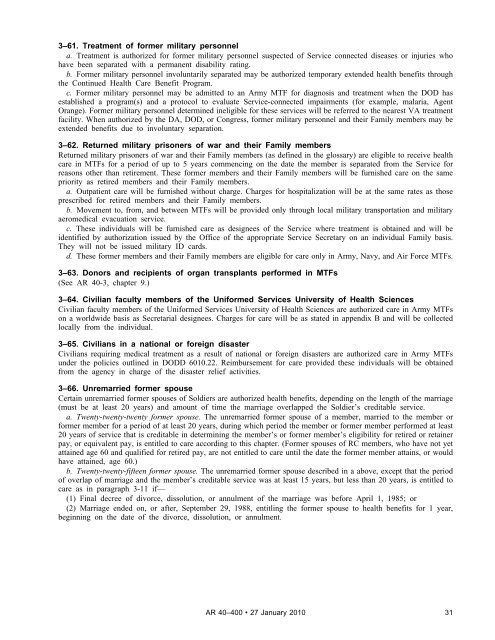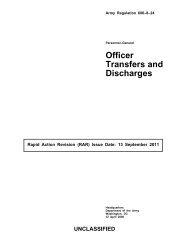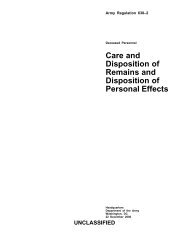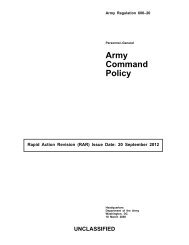Patient Administration - Army Publishing Directorate - U.S. Army
Patient Administration - Army Publishing Directorate - U.S. Army
Patient Administration - Army Publishing Directorate - U.S. Army
Create successful ePaper yourself
Turn your PDF publications into a flip-book with our unique Google optimized e-Paper software.
3–61. Treatment of former military personnel<br />
a. Treatment is authorized for former military personnel suspected of Service connected diseases or injuries who<br />
have been separated with a permanent disability rating.<br />
b. Former military personnel involuntarily separated may be authorized temporary extended health benefits through<br />
the Continued Health Care Benefit Program.<br />
c. Former military personnel may be admitted to an <strong>Army</strong> MTF for diagnosis and treatment when the DOD has<br />
established a program(s) and a protocol to evaluate Service-connected impairments (for example, malaria, Agent<br />
Orange). Former military personnel determined ineligible for these services will be referred to the nearest VA treatment<br />
facility. When authorized by the DA, DOD, or Congress, former military personnel and their Family members may be<br />
extended benefits due to involuntary separation.<br />
3–62. Returned military prisoners of war and their Family members<br />
Returned military prisoners of war and their Family members (as defined in the glossary) are eligible to receive health<br />
care in MTFs for a period of up to 5 years commencing on the date the member is separated from the Service for<br />
reasons other than retirement. These former members and their Family members will be furnished care on the same<br />
priority as retired members and their Family members.<br />
a. Outpatient care will be furnished without charge. Charges for hospitalization will be at the same rates as those<br />
prescribed for retired members and their Family members.<br />
b. Movement to, from, and between MTFs will be provided only through local military transportation and military<br />
aeromedical evacuation service.<br />
c. These individuals will be furnished care as designees of the Service where treatment is obtained and will be<br />
identified by authorization issued by the Office of the appropriate Service Secretary on an individual Family basis.<br />
They will not be issued military ID cards.<br />
d. These former members and their Family members are eligible for care only in <strong>Army</strong>, Navy, and Air Force MTFs.<br />
3–63. Donors and recipients of organ transplants performed in MTFs<br />
(See AR 40-3, chapter 9.)<br />
3–64. Civilian faculty members of the Uniformed Services University of Health Sciences<br />
Civilian faculty members of the Uniformed Services University of Health Sciences are authorized care in <strong>Army</strong> MTFs<br />
on a worldwide basis as Secretarial designees. Charges for care will be as stated in appendix B and will be collected<br />
locally from the individual.<br />
3–65. Civilians in a national or foreign disaster<br />
Civilians requiring medical treatment as a result of national or foreign disasters are authorized care in <strong>Army</strong> MTFs<br />
under the policies outlined in DODD 6010.22. Reimbursement for care provided these individuals will be obtained<br />
from the agency in charge of the disaster relief activities.<br />
3–66. Unremarried former spouse<br />
Certain unremarried former spouses of Soldiers are authorized health benefits, depending on the length of the marriage<br />
(must be at least 20 years) and amount of time the marriage overlapped the Soldier’s creditable service.<br />
a. Twenty-twenty-twenty former spouse. The unremarried former spouse of a member, married to the member or<br />
former member for a period of at least 20 years, during which period the member or former member performed at least<br />
20 years of service that is creditable in determining the member’s or former member’s eligibility for retired or retainer<br />
pay, or equivalent pay, is entitled to care according to this chapter. (Former spouses of RC members, who have not yet<br />
attained age 60 and qualified for retired pay, are not entitled to care until the date the former member attains, or would<br />
have attained, age 60.)<br />
b. Twenty-twenty-fifteen former spouse. The unremarried former spouse described in a above, except that the period<br />
of overlap of marriage and the member’s creditable service was at least 15 years, but less than 20 years, is entitled to<br />
care as in paragraph 3-11 if—<br />
(1) Final decree of divorce, dissolution, or annulment of the marriage was before April 1, 1985; or<br />
(2) Marriage ended on, or after, September 29, 1988, entitling the former spouse to health benefits for 1 year,<br />
beginning on the date of the divorce, dissolution, or annulment.<br />
AR 40–400 27 January 2010<br />
31
















